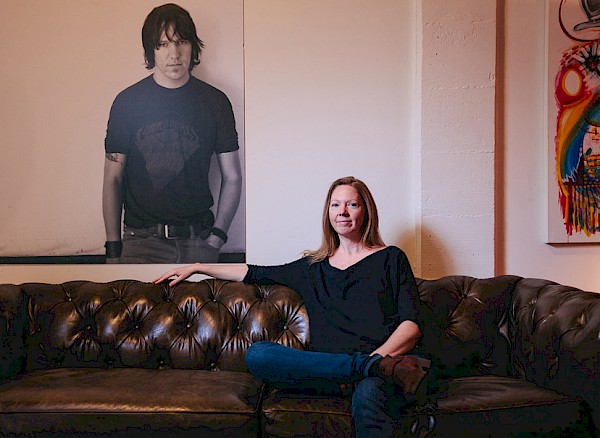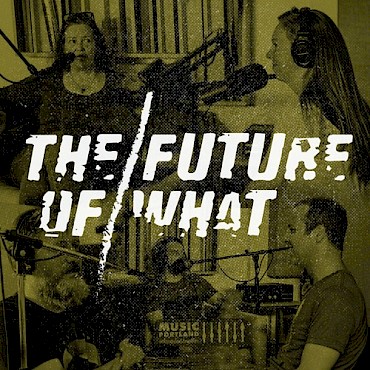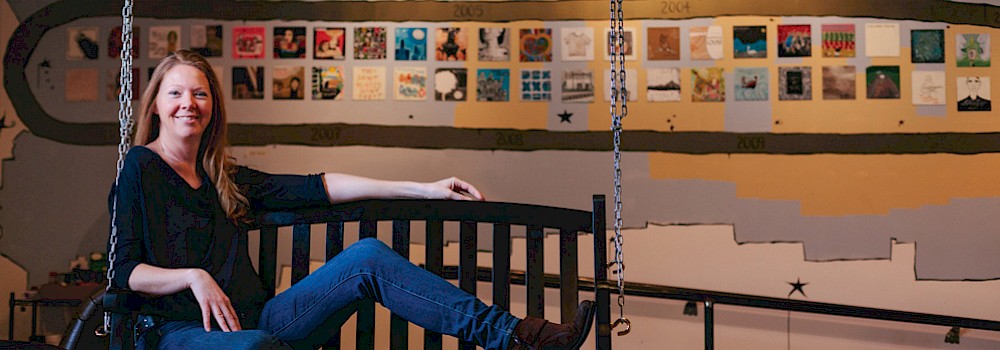 Mr. Elliott Smith and Dr. Portia SabinIn 2006, Portia Sabin was tasked with shutting down the now 27-year-old indie record label Kill Rock Stars. With a Ph.D. in anthropology from Columbia, “I had one foot in academia and one foot in music,” Sabin says. She chose to jump feet first into the music biz, fully committing to what had long been her passion.
Mr. Elliott Smith and Dr. Portia SabinIn 2006, Portia Sabin was tasked with shutting down the now 27-year-old indie record label Kill Rock Stars. With a Ph.D. in anthropology from Columbia, “I had one foot in academia and one foot in music,” Sabin says. She chose to jump feet first into the music biz, fully committing to what had long been her passion.
“I really went to grad school because I had to do something legit while I played drums in punk bands and,” she thought, “this’ll make my mother happy.” In the mid-aughts, she was juggling a postdoc fellowship at the University of Washington and managing dance punks Gossip when it seemed like a good idea to take Kill Rock Stars to new heights while the industry was consistently yielding new lows. Releasing 46 records in 2006 and 27 in 2007, Sabin came out the other side and saw the label, which was founded in Olympia, Wash., by her husband, Slim Moon, through some of the industry’s toughest years.
 The Future of What recently hosted board members of the local advocacy group MusicPortland for a conversation about the future of music in the Rose City—listen below!Featuring a roster that has made some of the Northwest’s most important music—like Elliott Smith, The Decemberists, Sleater-Kinney, The Thermals, Horse Feathers, Quasi, Bikini Kill and countless others—the label has constantly sought to uplift underserved voices, and Sabin and Co. have added rising locals like Summer Cannibals and Lithics to that list in recent years. But she’s also looked to innovate—sometimes “taking chances on certain weird things,” like engraved glass dildos—by focusing on talent outside of the music world, declaring, “Comedy is the new punk rock.”
The Future of What recently hosted board members of the local advocacy group MusicPortland for a conversation about the future of music in the Rose City—listen below!Featuring a roster that has made some of the Northwest’s most important music—like Elliott Smith, The Decemberists, Sleater-Kinney, The Thermals, Horse Feathers, Quasi, Bikini Kill and countless others—the label has constantly sought to uplift underserved voices, and Sabin and Co. have added rising locals like Summer Cannibals and Lithics to that list in recent years. But she’s also looked to innovate—sometimes “taking chances on certain weird things,” like engraved glass dildos—by focusing on talent outside of the music world, declaring, “Comedy is the new punk rock.”
It’s a topic she’s covered on her industry podcast, The Future of What, where she delves into the realities facing musicians today while also talking with professionals about technology, contracts or social media.
“An educated artist is their own best friend,” she says. They need to know “how the business works because they are in the business whether they want to believe that or not.” More than 100 episodes in, “The need for it has grown because, for some reason, even though there’s less and money in the business, there’s more and more people every year who just want to be artists,” Sabin quips.
The platform also gives her an opportunity, in a similar spirit as the label, to highlight overlooked sides of the music industry—from addiction to exploring behind the scenes with the women of Pearl Jam’s road crew. Sabin believes it’s important for underrepresented voices—whether female, people of color or LGBTQ—to be heard, and for others who count themselves amongst these groups to see individuals like them in impactful roles.
 As a board member of multiple industry organizations (A2IM, RIAA, The Recording Academy’s Pacific Northwest Chapter), Sabin seeks to support musicians, especially at home as the president of the burgeoning nonprofit MusicPortland. Because for her, and the legions of folks she works with every day in the world of independent music, “everybody’s in this to help artists succeed.”
As a board member of multiple industry organizations (A2IM, RIAA, The Recording Academy’s Pacific Northwest Chapter), Sabin seeks to support musicians, especially at home as the president of the burgeoning nonprofit MusicPortland. Because for her, and the legions of folks she works with every day in the world of independent music, “everybody’s in this to help artists succeed.”









